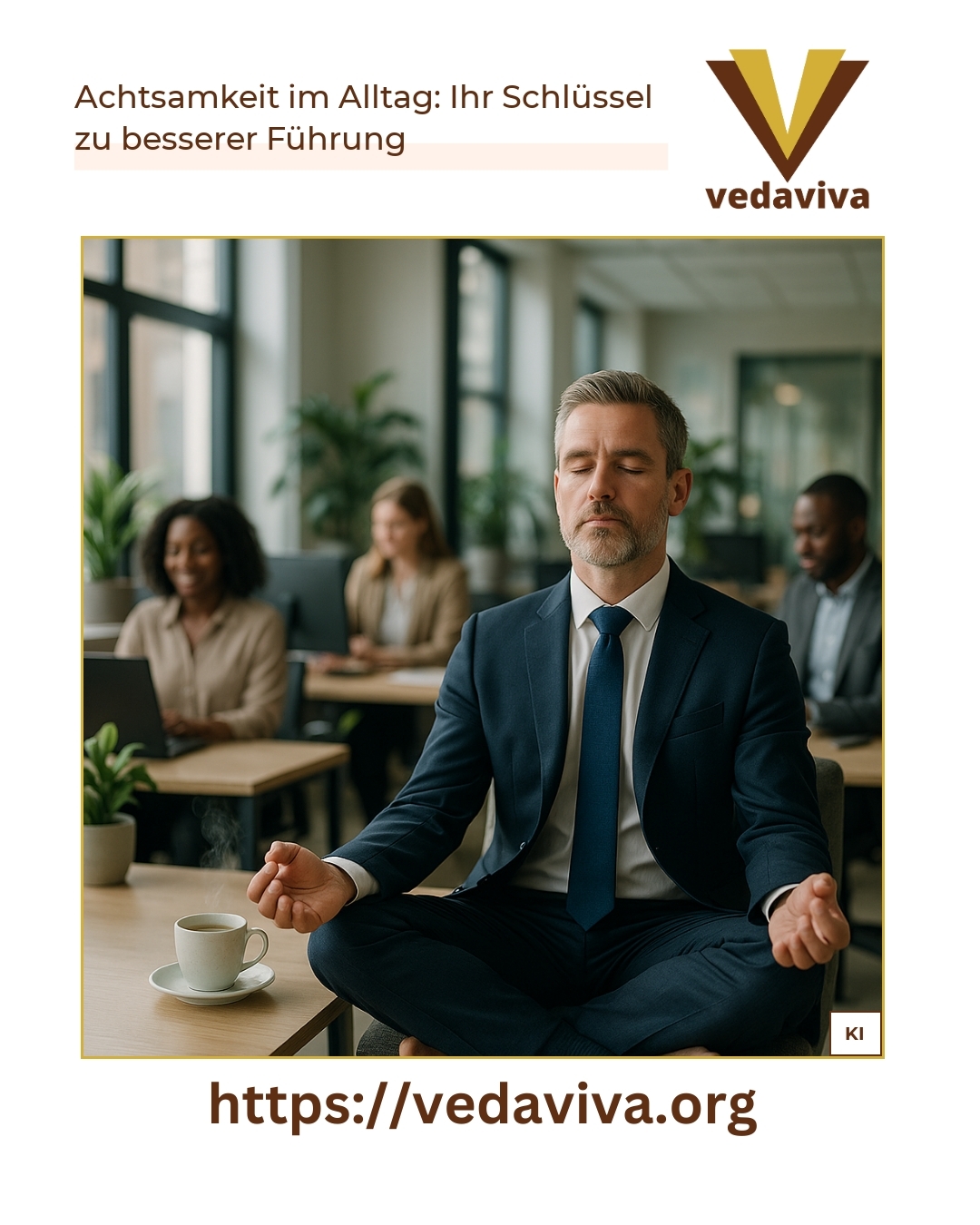Mindfulness in everyday life as a foundation for conscious leadership
Mindfulness in everyday life is increasingly recognised as a key competence for successful leadership. It is not just about coping with stress, but about a deeper presence that promotes clarity, empathy and resilient decision-making in a professional environment. Managers who practise mindfulness in everyday life strengthen their ability to manage themselves and their team more consciously.
In practice, mindfulness can be seen in everyday life through conscious breaks during the working day, for example, in which managers consciously pay attention to their breathing or posture. Another method is mindful listening in meetings, which helps to better understand the perspectives of employees and avoid misunderstandings. Reflecting on your own reactions during difficult conversations is also a way of being mindful in your day-to-day leadership role.
BEST PRACTICE at company XYZ (name changed due to NDA contract) In a medium-sized company, mindfulness was systematically introduced into everyday life by managers scheduling five minutes a day for a short mindfulness exercise. This promoted concentration during complex decision-making processes and significantly improved the handling of stressful situations. Employees reported increased awareness and a positive change in the team atmosphere.
How mindfulness reduces stress in everyday life and creates more clarity
Mindfulness in everyday life helps to reduce stress by helping to recognise and interrupt automatic thought cycles. Those who use this practice regularly can not only manage acute stress better, but also increase their resilience in the long term. The direct result is an increased ability to concentrate and greater clarity in decision-making.
For example, a manager could consciously pause for a few minutes before an important meeting to concentrate on their breathing and sort out any thoughts they have. This often has a positive effect on the quality of communication and their own decision-making ability. Mindfully recognising the emotions in the team also creates a more relaxed working environment.
BEST PRACTICE at ABC (name changed due to NDA contract) There, managers use mindfulness in everyday life to take a short mental break before difficult conversations with employees. As a result, they were able to react more clearly and calmly to critical situations. As a result, employees perceived the management as more trustworthy and understanding.
The importance of mindfulness in everyday life for interpersonal relationships
A mindful attitude in everyday life also promotes empathy and understanding within teams. Managers who practise mindfulness are more aware of their employees' signals and react more sensitively to their needs. This creates a better relationship culture based on mutual respect and openness.
In practice, managers can give mindful feedback by actively listening and responding compassionately to concerns. This creates spaces in which employees feel safe and can better realise their potential. Mindfulness in everyday life thus supports the development of a co-operative and innovation-promoting working environment.
BEST PRACTICE at LMN (name changed due to NDA contract) The management simulated mindfulness exercises in workshops in which team members could openly share feelings and thoughts. The result was improved mutual understanding and more open collaboration, which had a positive impact on the working atmosphere.
Impulses for the implementation of mindfulness in everyday life in the leadership role
In order to systematically integrate mindfulness into everyday life as a manager, it is a good idea to consciously organise daily routines. For example, short rituals such as morning reflections or evening reviews can help to maintain inner balance and prioritise more clearly. Consciously organising meetings with breaks for moments of mindfulness also increases attentiveness and improves group dynamics.
It also makes sense to embed mindfulness into the corporate culture, for example through regular workshops or training sessions. This usually goes hand in hand with increased satisfaction and productivity in the team, as employees treat themselves and others more mindfully.
BEST PRACTICE at DEF organisation (name changed due to NDA contract) There, managers were instructed to promote mindfulness in everyday life through daily mini-breaks and to share these with the team. This strengthened the connection within the team and ensured greater serenity in hectic times. At the same time, workplace conflicts were better defused.
Mindfulness in everyday life as the key to personal development
The continuous use of mindfulness in everyday life helps managers to develop a deeper understanding of themselves. They learn to better recognise and manage their own thoughts and feelings, which contributes to a more balanced leadership style. This inner attitude often has a positive effect on motivation and authenticity.
The practice also offers space for creative impulses that can promote change and innovation in the company. As inner awareness grows, so does the ability to deal with challenges more calmly.
My analysis
Mindfulness in everyday life is a valuable resource for managers who want to make their work more sustainable and people-orientated. It helps to reduce stress, promote concentration and improve interpersonal communication. Managers who practise mindfulness in their day-to-day work not only strengthen themselves, but also their entire team. Mindfulness is therefore becoming increasingly important as an accompanying source of inspiration for conscious leadership and personal development.
Further links from the text above:
The 10 benefits of mindfulness in everyday life | Coaching [1]
Mindfulness: definition & examples [3]
Legal notice: Coaching does not replace therapy. It serves personal development. I do not diagnose or promise a cure. My offer is for personal development and is not a substitute for medical, psychotherapeutic or curative treatment. Please consult a medically qualified specialist if you have any health complaints. The experiences described here are based on individual feedback from my clients. They are not a guarantee of success and do not replace medical or therapeutic counselling. For more information and if you have any questions, please contact Contact us on the topic or read further blog posts on the Topic here.













